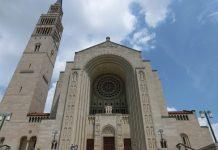From the Editor’s Desk (Monday, October 2, 2017, Gaudium Press) The eminent dignity of the holy angels and their importance for our spiritual life has been recognized by many Saints. Here are some selections from just a few of the Saints who have written on the angels.
St. Augustine
From the City of God, Bk XI, ch. 9
WHAT THE SCRIPTURES TEACH US CONCERNING THE CREATION OF THE ANGELS
At present, since I have undertaken to treat of the origin of the Holy City, and first of the holy angels, who constitute a large part of this city, and indeed the more blessed part, since they have never been expatriated, I will give myself to the task of explaining, by God’s help…the Scriptures which relate to this point. Where Scripture speaks of the world’s creation, it is not plainly said whether or when the angels were created; but if mention of them is made, it is implicitly under the name of “heaven”, when it is said, “In the beginning God created the heavens and the earth,” or perhaps rather under the name of “light”….
Yet, though the fact that the angels are the work of God…it is indeed not explicitly mentioned; but elsewhere Holy Scripture asserts it in the clearest manner. For…here the angels are most expressly and by divine authority said to have been made by God, for of them among the other heavenly things it is said, “He commanded, and they were created” (Ps 148). Who, then, will be bold enough to suggest that the angels were made after the six days’ creation? If any one is so foolish, his folly is disposed of by a Scripture of like authority, where God says, “When the stars were made, the angels praised me with a loud voice.” (Job 38:7).
The angels therefore existed before the stars; and the stars were made the fourth day. Shall we then say that they were made the third day? Far from it; for we know what was made that day. The earth was separated from the water … and the earth produced all that grows on it. On the second day, then? Not even on this; for on it the firmament was made between the waters above and beneath, and was called “heaven.” …There is no question, then, that if the angels are included in the works of God during these six days, they are that light which was called “day,” and whose unity Scripture signalizes by calling that day not the “first day,” but “one day.”
…For when God said, “Let there be light, and there was light,” if we are justified in understanding in this light the creation of the angels, then certainly they were created partakers of the eternal Light which is the unchangeable Wisdom of God, by which all things were made, and whom we call the Only-Begotten Son of God; so that they, being illumined by the Light that created them, might themselves become light and be called “day,” in participation of that unchangeable Light and Day which is the Word of God, by whom both themselves and all else were made. “The true Light, which lighteth every man that cometh into the world” (Jn 1:9)-this Light lighteth also every pure angel, that he may be light not in himself, but in God; from whom if an angel turn away, he becomes impure, as are all those who are called unclean spirits, and are no longer light in the Lord, but darkness in themselves, being deprived of the participation of Light eternal. For evil has no positive nature; but the loss of good has received the name “evil.”
Sermon on the Song of Songs, 7
St. Bernard of Clairvaux, known as the “last of the Fathers” and Doctor of the Church, wrote an extended commentary on the Song of Songs. In this work he frequently meditates upon the angels, their nature and ministry. We cite here his meditation on the nine choirs of angels and their ministries towards God and men.
“Let him kiss me,” she exclaimed, “with the kiss of his mouth.” A sublime favor is petitioned, and hence there is need that the petitioner should be commended by a becoming modesty in the manner of the request. One who seeks access to the interior of the home goes round to the intimate friends or members of the household to attain what he desires. In this present instance who might these people be? In my opinion they are the holy angels who wait on us as we pray, who offer to God the petitions and desires of men, at least of those men whose prayer they recognize to be sincere, free from anger and dissension. We find proof of this in the words of the angel to Tobias: “When you prayed with tears and buried the dead, and left your dinner and hid the dead by day in your house, and buried them by night, I offered your prayer to the Lord.” I feel that you are fully persuaded of this from many other testimonies of Scripture. That the holy angels do condescend to mingle with us when we praise God in psalmody is very clearly stated by the Psalmist: “The princes went before, joined with the singers, in the midst of young damsels playing on timbrels.” He also said: “I will sing praise to you in the sight of the angels.”
For this reason it makes me sad to see some of you deep in the throes of sleep during the night office, to see that instead of showing reverence for those princely citizens of heaven you appear like corpses. When you are fervent they respond with eagerness and are filled with delight in participating in your solemn offices. What I fear is that one day, repelled by our sloth, they will angrily depart. Too late then shall we remorsefully cry out to God: “You have turned my friends away from me and made me repulsive to them;” or again: “You have turned my friends and neighbors from me, my acquaintances from my misery;” or yet again: “They that were near me stood afar off, and they that sought my soul used violence.” It is certain indeed that if the good spirits withdraw from us, we shall not easily withstand the obsessions of the evil ones. And so I must warn the slothful: “Cursed be he who does the work of God half-heartedly.” It is not I but the Lord who says: “Would that you were cold or hot! So, because you are lukewarm, I will spew you out of my mouth.”
Be mindful then of these angelic princes when you go to pray or to sing the Psalms; stand with disciplined reverence and be proud that your angels continuously see the face of the Father. Since they are all spirits whose work is service, sent to help those who will be the heirs of salvation, they bear our prayers to God in heaven and return laden with graces for us. Let us make use of the service of those in whose company our lot is cast, that by the mouths of children and babes in arms praise may be made perfect. Let us invite them: “Sing praises to God, sing praises!” And let us hear them in turn responding: “Sing praises to our king, sing praises!”
We cite here his meditation on the nine choirs of angels and their ministries towards God and men.
The Angels (meaning here the ninth choir), looking with undeviating gaze into the profound abyss of the divine judgments, are filled with inexpressible joy at the sight of their supreme righteousness; it is their glory that, through their ministry, these judgments are put into operation and made known to men. For this reason they so rightly love the Lord Christ. Scripture says: “The truth is, they are all spirits whose work is service, sent to help those who will be the heirs of salvation” [cf. Heb 1:14].
And the Archangels – whom we must regard as differing in some degree from those called Angels – experience a delight that is filled with awe as they enter more closely into the counsels of eternal wisdom, and are commissioned to execute them with supreme skill at the proper place and time. Here you have the reason why these in turn love the Lord Christ.
Other blessed spirits are named Virtues because their God-given vocation is to explore and admire with a happy curiosity the hidden and eternal causes of signs and wonders, signs that they display throughout the earth whenever they please by the powerful manipulation of the elements. As a consequence, these naturally burn with love for the Lord of Hosts, for Christ, the power of God. For it is an occupation full of sweetness and grace to contemplate the obscure mysteries of wisdom in Wisdom itself, a source of the greatest honor and glory that the effects produced by causes hidden in the Word of God should be revealed for the world’s admiration by their ministry.
Yet other spirits are named Powers. While these find their happiness in contemplating and praising the divine omnipotence of our crucified Lord that extends so effectively into every place, they are also gifted with the power to overthrow and subdue the hostile power of demons and men in defense of those who will be the heirs of salvation. And surely these have a perfect reason for loving the Lord Jesus.
Above them are the Principalities, who, contemplating Him from their higher vantage point, clearly perceive that He is the source whence all things spring, the first-born of all creation. So great is the princely dignity with which they are endowed that nothing on earth is outside their dominion; and from their exalted seat of power they change and regulate at will the fall of kingdoms and governments and officials of any rank. According to individual merits they place those who are first in the last place and the last first; they pull down the mighty from their thrones and exalt the lowly. This is the source of their incentive to love.
Then come the Dominations, who also love the Lord [Jesus]. And the reason? With a presumption meriting only praise they probe more piercingly and sublimely into the limitless and insuperable lordship of Christ, whose presence and power reach everywhere throughout the universe. With a planned excellence, He bends all things from the highest to the lowest to the sway of His supremely upright will: the succession of the seasons, the movement of bodies, the propensities of the mind. He exercises this control with so provident a care that not one of these phenomena suffers the minutest failure in its functioning, not even by an iota; and He does it with an effort so facile that He feels not the least disquietude or misgiving. Fascinated by the flawless tranquility with which the Lord of hosts governs the universe, they are caught up in a wondrous ecstasy of contemplation that is utterly delightful, utterly intense; and, consciously transported into the mighty ocean of God’s splendor, they find themselves in a secret haven so serenely calm, so completely and securely peaceful, that while they recline there…the other angelic hosts, out of reverence for their prerogative of unimpeachable dominance, perform official services on their behalf.
Next come the Thrones, who are the seat of God. These spirits have a more just cause and more abundant reasons for loving than all the others we have mentioned. For when you enter the king’s palace do you not see that though there are footstools, chairs and armchairs in every room, the king’s throne is on a higher level? You do not have to ask where the king usually sits; you notice at once the seat that is more ornate and more elevated than the rest. And so you must understand that the adorned beauty of these spirits surpasses that of all the others, for upon them by a special and stupendous act of graciousness, the God of majesty has chosen to take His seat. If a seated posture symbolizes the teaching office, one may presume that Christ, the Wisdom of God, our unique teacher in heaven and on earth, although reaching everywhere because of His spiritual power, yet imparts a special light to these in particular on whom He is throned, and from this august rostrum teaches knowledge to angels and to men. The Angels receive knowledge of God’s judgments, the Archangels of His counsels. The Virtues discover the time, place and nature of the signs they are to perform; and all, whether Powers or Principalities or Dominations, learn the extent of their official duties, the privileges of their exalted rank and a caution to which all must pay heed, not to abuse the power they have received for the sake of their own glory or convenience.
Then there are those multitudes of spirits called Cherubim. If we understand them in terms of their title, it seems to me that they possess nothing received from or by means of the others; for they are free to drink their fill from the very fountainhead, under the benign patronage of the Lord Jesus Himself, who leads them on to the very fullness of truth and eagerly unfolds before their gaze the treasures of wisdom and knowledge hoarded in the depths of His being. Neither do the spirits we call Seraphim depend on them for anything, for God, who is Love, has so drawn and assimilated them to Himself, so filled them with the ardor of affection that burns in Himself, that they seem to be one spirit with God, just as fire that flames into the air imparts its own heat and color to it and the enkindled air becomes part of the very fire. The Cherubim’s bent is to contemplate God’s infinite knowledge, the Seraphim adhere to the Love that never ends. Hence they derive their names from that occupation in which each is preeminent: the name Cherub denotes one filled with knowledge, the name Seraph one inflamed with or inciting to love.
Source Opus Sanctorum Angelorum









































